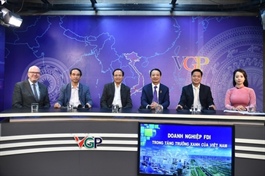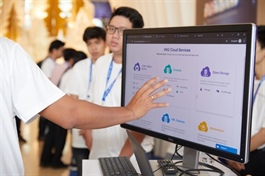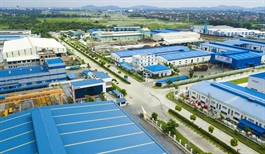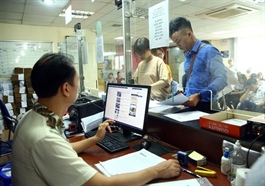Vietnam-US bilateral trade soars 300-fold since normalization of ties
Vietnam-US bilateral trade soars 300-fold since normalization of ties
Close to 30 years has passed since Vietnam and the U.S. normalized ties, their two-way trade rose over 300-fold to US$138 billion in 2022 from $450 million in 1995.

“The fact that more than 50 U.S. enterprises visited Hanoi reflected the U.S. business community’s confidence in prospects for economic growth and the leadership of Vietnam, despite challenges anticipated for the global and Vietnamese economies this year due to the ongoing Ukraine-Russia military conflict and sanctions against Russia,” U.S.-ASEAN Business Council (USABC) President and CEO Ted Osius told Tuoi Tre (Youth) newspaper.
USABC is an important bridge in terms of economic cooperation between the U.S. and ASEAN.
Osius said that 52 businesses from the U.S. came to Vietnam in March this year to seek business and investment opportunities.
The USABC leader affirmed that the U.S. enterprises discovered substantial opportunities for investment and doing business in Vietnam.
Despite a possible global recession looming in multiple regions, Southeast Asia’s economy is witnessing growth.
For instance, Vietnam reported its growth rate reached over eight percent while its neighbors saw an increase of over five percent last year.
“The message conveyed by the Vietnamese government is clear and consistent: ‘We will address your concerns and take swift actions’," the former U.S. ambassador to Vietnam said.
David Dapice, a leading expert on economic development at the John F. Kennedy School of Government, Harvard University, told Tuoi Tre that the visit of the U.S business delegation was aimed at studying whether foreign direct investment could be switched from the assembling industry to other sectors with higher added value or sophistication.
The switch will require much effort of Vietnam in training human resources of higher quality to be able to enhance the country’s competitiveness, in addition to the supply of green energy and better infrastructure facilities, he added.
Businesses in the U.S. opted to visit Vietnam as the Southeast Asian nation is considered a safe investment destination, especially amid rising U.S.-Sino tensions, Dapice continued.
Dapice, who is among the experts on Vietnam-U.S. trade, joined a public custody hearing related to a U.S. investigation into possible currency manipulation by Vietnam in 2020.
According to him, the overall picture of Vietnam-U.S. economic cooperation could be adjusted if more investments of high quality are made, with Vietnam jumping up on the value chain map.
It would be economically appropriate to make efforts to diversify markets and supply chains, as the workforce in China is reportedly shrinking and aging, Dapice said.
“Diversification is needed for risk management effort," he remarked.
“Vietnam is reaping economic benefits from the ongoing changes, and the sound relations between Vietnam and the U.S. mean quite a lot to the Southeast Asian nation and even more than that if the Vietnam-U.S. ties advance."
In March this year, the phone talks between General Secretary of Vietnam’s Communist Party Nguyen Phu Trong and U.S. President Joe Biden served as a key milestone for the Vietnam-U.S. ties in 2023, which also marks a decade since the two countries established their comprehensive partnership.
The two leaders during their phone talks had reviewed the Vietnam-U.S. relations, discussed major orientations to advance the relations as well as other plans in the fields of international cooperation.
The outcome of the phone talks featured three highlights.
Both sides agreed to deepen the bilateral ties.
Besides, the U.S. reiterated its commitment to respecting Vietnam’s independence, sovereignty, territorial integrity, and political institutions.
The two leaders also accepted invitations to visit each other’s country and assigned relevant units to arrange the visits at a proper time.
The phone talks also incorporated policy implications for the Vietnam-U.S. ties in the years to come.
The Biden administration’s stance reflected the U.S. commitment to tightening the Vietnam-U.S. relations while showing its respect for Vietnam’s pursuit of a foreign policy of independence, self-reliance, peace, friendship, cooperation, development, multilateralization, and diversification.
The U.S. also affirmed the vital role of Vietnam in the former’s Indo-Pacific Strategy, endorsing ASEAN Centrality as well as ASEAN Outlook on the Indo-Pacific.























